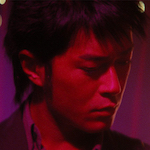 Man, what am I doing leaving all these Johnnie To movies unseen? Whenever I watch one I seem to fall in love. Case in point, THROW DOWN (2004). As far as I knew it wasn’t even one of his more popular ones when Criterion released it in 2021, at least not in the U.S. It was just a forgotten Tai Seng DVD from the aughts. But now it is the recipient of the prestigious The Best Thing I’ve Seen Lately award.
Man, what am I doing leaving all these Johnnie To movies unseen? Whenever I watch one I seem to fall in love. Case in point, THROW DOWN (2004). As far as I knew it wasn’t even one of his more popular ones when Criterion released it in 2021, at least not in the U.S. It was just a forgotten Tai Seng DVD from the aughts. But now it is the recipient of the prestigious The Best Thing I’ve Seen Lately award.
 Most of To’s movies I’ve seen have been crime movies. They have good action but they’re more notable for their visual beauty and operatic emotion. They usually feel more poetic than badass, though they can be both. THROW DOWN technically has some crime in it, but that’s not the main topic, and to my surprise this is largely a comedy. Not the broad type of humor I associate with Hong Kong cinema, but a very dry, offbeat sort of humor of different characters matter-of-factly following their idiosyncratic pursuits into strange situations and never making a big deal out of it. Never mugging, never underlining.
Most of To’s movies I’ve seen have been crime movies. They have good action but they’re more notable for their visual beauty and operatic emotion. They usually feel more poetic than badass, though they can be both. THROW DOWN technically has some crime in it, but that’s not the main topic, and to my surprise this is largely a comedy. Not the broad type of humor I associate with Hong Kong cinema, but a very dry, offbeat sort of humor of different characters matter-of-factly following their idiosyncratic pursuits into strange situations and never making a big deal out of it. Never mugging, never underlining.
For example, we follow this guy named Tony (Aaron Kwok, who I just saw in MONK COMES DOWN THE MOUNTAIN), whose passion in life is judo. One night he shows up at the AH After Hours Bar & Lounge and bets the 6’ 2”, 320 pound doorman (Ho Sai-Man, MOTORWAY) that he can throw him down with just one move. So they square up in the street, he throws him, hops over the barrier, and goes inside with plenty of money for his bar tab.
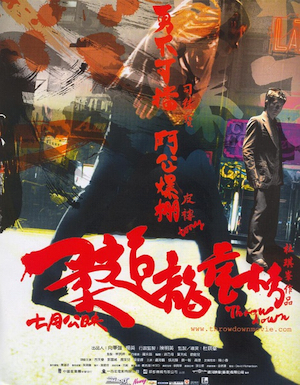 He wants to talk to the guy who runs the place, Szeto Bo (Louis Koo, DRUG WAR, PARADOX), but he has to wait. Brother Bo is in the middle of being forced to drink ten pints of beer by some guys he lost a bet to, I think? When Tony finally gets to talk to him Bo is headed to the stage to play guitar with the band. When he says, “I’m Tony. I practice judo too. I want to fight you,” the sax player (Haitao Li, GALLANTS) gets in his face. Tony says, “Not you.”
He wants to talk to the guy who runs the place, Szeto Bo (Louis Koo, DRUG WAR, PARADOX), but he has to wait. Brother Bo is in the middle of being forced to drink ten pints of beer by some guys he lost a bet to, I think? When Tony finally gets to talk to him Bo is headed to the stage to play guitar with the band. When he says, “I’m Tony. I practice judo too. I want to fight you,” the sax player (Haitao Li, GALLANTS) gets in his face. Tony says, “Not you.”
But then Bo passes out on stage. No duel with him tonight, so when they close up at the end of the night Tony is waiting outside to challenge the sax player. Right there on the concrete, wearing their nice suits, they go to it.
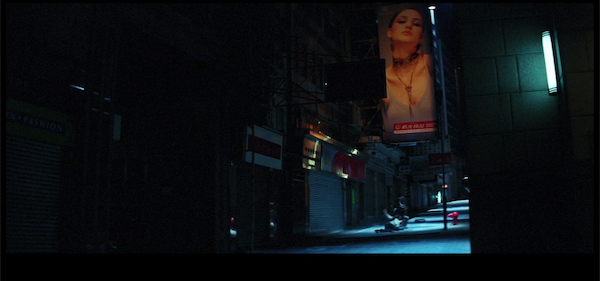
Most of the characters in this are very good at judo, and willing to accept challenges, even on a street, or a rooftop, or in a bar. There are so many layers of beauty here. First of all, the only director I’ve seen make Hong Kong look more beautiful and romantic than To did here is Wong Kar Wai. Second, there’s the beauty of this idea of Hong Kongers proficient in the techniques and traditions of a less popular Japanese martial art, practicing them in earnest in this modern urban setting beneath fashion billboards and signs for Diesel Jeans and stuff.
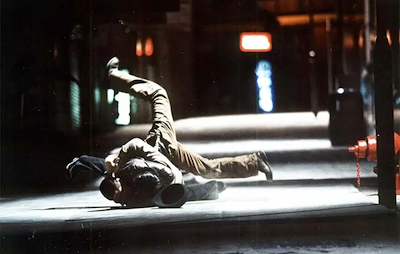 And then there’s the beauty and economy of the actual fighting, made up mostly of quick movements, flipping and rolling the opponent, locking an arm or leg. It’s exaggerated, of course, but it’s very distinct from what we’re used to seeing on screen. (Martial arts director: Yuen Bun, KNOCK OFF, DETECTIVE DEE AND THE MYSTERY OF THE PHANTOM FLAME, FLYING SWORDS OF DRAGON GATE.)
And then there’s the beauty and economy of the actual fighting, made up mostly of quick movements, flipping and rolling the opponent, locking an arm or leg. It’s exaggerated, of course, but it’s very distinct from what we’re used to seeing on screen. (Martial arts director: Yuen Bun, KNOCK OFF, DETECTIVE DEE AND THE MYSTERY OF THE PHANTOM FLAME, FLYING SWORDS OF DRAGON GATE.)
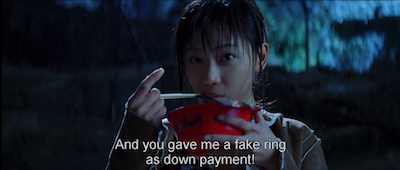 One of the few characters who doesn’t give a fuck about judo is Mona (Cherrie Ying, FULLTIME KILLER), who we meet as all her belongings are being thrown in the street by a landlord screaming at her about never having paid rent. She doesn’t seem concerned – she half smiles while watching the tirade and finishing her bowl of instant noodles. This will not be a movie about realistically dealing with financial difficulties. There are two different scenes where Mona joyfully runs with a bunch of stolen cash that starts as a big stack and turns into a loose armload slipping away and leaving a trail. In one case it seems to be multiplying, it’s just littering the street, and she does try to pick some of it back up, but not desperately. Laughing about it. It’s fun.
One of the few characters who doesn’t give a fuck about judo is Mona (Cherrie Ying, FULLTIME KILLER), who we meet as all her belongings are being thrown in the street by a landlord screaming at her about never having paid rent. She doesn’t seem concerned – she half smiles while watching the tirade and finishing her bowl of instant noodles. This will not be a movie about realistically dealing with financial difficulties. There are two different scenes where Mona joyfully runs with a bunch of stolen cash that starts as a big stack and turns into a loose armload slipping away and leaving a trail. In one case it seems to be multiplying, it’s just littering the street, and she does try to pick some of it back up, but not desperately. Laughing about it. It’s fun.
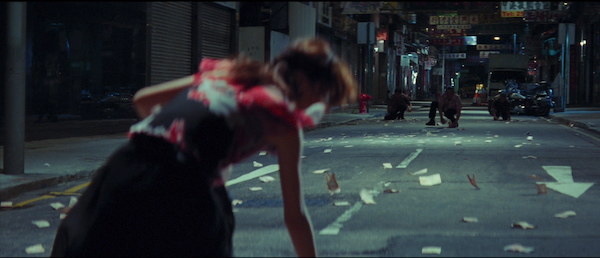
She doesn’t worry about money, but about her dream of making it as a singer, something that may not be in the cards for her, but she will never stop trying, it’s clear. She actually struck out in Taiwan first, and she’s just gonna go stubbornly from country to country if she has to. She’s kinda NYAD about it. You gotta respect it.
So the next day at AH, Mona wakes up a passed out Bo, says she’s there for the audition.
“What audition?”
“Aren’t you hiring a singer?”
“Yes.”
Here’s one of the more absurd jokes in the movie that really made me laugh: while Mona performs for Bo he dunks his head in ice water, and gets a call from the sax player that he can’t come into work tonight because Tony dislocated his shoulder last night.
“Why— Why did you get into a fight? Tony? Who’s Tony? What does he look like?”
And before he can start to consider what the band will do without their sax player, Tony bursts through a beaded curtain playing the sax part of Mona’s song.
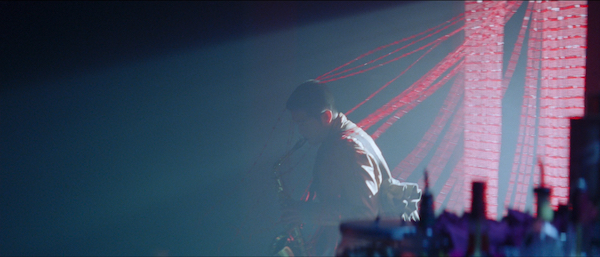
We must now consider the odds of two different judoka saxophonists accidentally clashing in Hong Kong. I really think it just happened that way, I don’t think Tony schemed to injure Brother Bo’s sax player to take his place, but he knows to take advantage of that window, and everyone is okay with it. Nobody has to say anything, he’s just in the band now.
The funniest part is the next stretch of the movie, where Bo is freaking out about some impending appointment, and drags Mona (still trying to get the job) and Tony (still trying to fight him) onto a bus with him, asking them cryptic questions like “Do you play video games?” and looking very distant while muttering things about “Don’t worry. It’s very simple. It’s nothing” and “No problem. We’ll take care of it. It’s taken care of,” while they have no clue what the fuck he’s talking about.
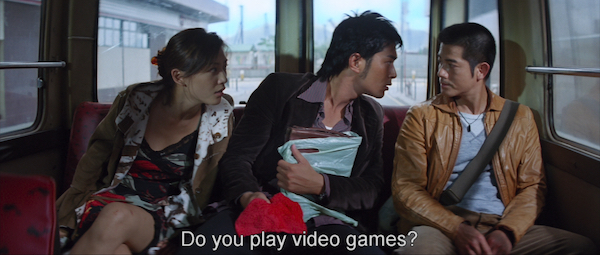
What the fuck he’s talking about turns out to involve staking out Boss Savage (Eddie Cheung Siu-fai, EXILED, VENGEANCE, BLACKHAT), a brutal loan shark who hangs out at the arcade playing video games against actual kids while terrified young men, chests heaving, come to him to pay their debts, apologizing for being late. Bo sits on the next row, peeking between machines as Tony and Mona follow his instructions to switch out Boss Savage’s satchel with a lookalike when he’s not looking. Boss Savage happens to look that direction and see Bo’s face, and then he clamors to climb between the games to get at him, followed by two thugs.
We will find that Bo is in a debt that he keeps trying to pay through gambling, which only makes it grow. Even without that knowledge, you assume he owes money to Savage, is trying to steal from him instead, and when Savage sees him there he figures it out and goes after him.
Except that’s not what it is – he’s actually kinda star struck! He knows Bo as “Judo Golden Boy.” He fought him once, back in the day. Wants Bo to recognize him, but he’s excited just to be able to meet him again. So we learn two important things here. #1, it’s not just this weirdo Tony – many people are in awe of the judo champion that Bo once was. #2, Boss Savage also does judo. That could come up later. But he really isn’t an antagonist – this isn’t that kind of movie. It’s something much more unique.
I know Louis Koo as an older grizzled guy, I gotta admit I didn’t even recognize him at first in this stylish, pretty man. I think it’s mostly the hair and the sideburns that change his look. But this whole movie has incredible fashion – I love all the wide ‘70s collars over corduroy blazers, and Tony’s jackets. I guess this and OCEAN’S TWELVE are the 2004 movies that don’t date that much because they were already so much cooler than the times.
Bo looks very cool, but his life is a mess. He leaves After Hours still holding the red bar towel he was using to dry off his hair after dunking in the sink, holds onto it to wipe sweat at the arcade, and later the mahjong game where he loses all the money he stole. When Tony realizes the state Bo is in he’s disgusted, because it means he won’t have a good match against him. He tosses him on the cement over and over and decides he’ll keep working at the bar until he gets a better fight with him.
That’s what’s great about Tony: he loves doing judo for the sake of doing judo. He’s going around challenging people not to prove he’s better, but to experience what he loves at the highest possible level. He sees this amazing older guy Lee Kong (Tony Ka Fai Leung, A BETTER TOMORROW III, SHE SHOOTS STRAIGHT, BODYGUARDS AND ASSASSINS) clear the floor (well, the street) in a huge brawl, so he goes to his dojo to challenge him. He loses, but doesn’t seemed bothered at all, tells Bo all about it, getting all excited talking about Lee Kong’s technique. Later Tony invents his own one-armed style and the idea doesn’t seem to be “now I can beat Lee Kong.” He just seems to love doing it.
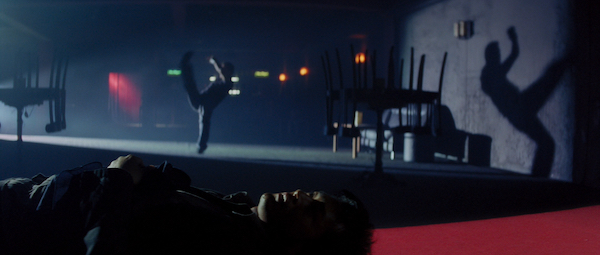
Eventually, when (spoiler) Bo’s passion is reignited, they spar a whole bunch and they both have big grins the whole time.
I marked that a spoiler even though it’s kind of a given that’s what this is about. Or maybe it’s not given, because it doesn’t really follow any genre structures, so it seems like it could go in any direction. It’s dedicated to Akira Kurosawa, and obviously references his judo movie SANSHIRO SUGATA, but To isn’t aping the master’s style or anything, he’s really operating on his own frequency. The feel is so distinct that when Tony suddenly hangs up a flyer for a judo tournament I had a moment of dread thinking “Oh no, I hope it doesn’t just turn into a normal tournament fighting movie now” – one of my favorite genres! – but I didn’t need to worry, it doesn’t do that.
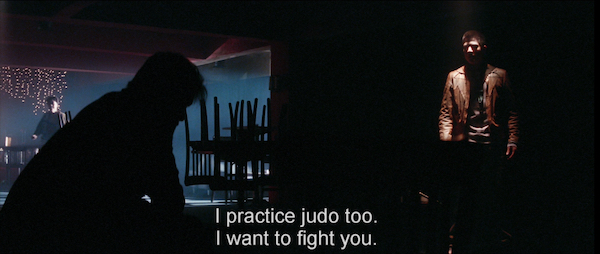
I love how much of it is set at the bar, including during the day, when the chairs are on the tables and most of the light is from sunbeams bleeding in. It’s not tonally a noir, but it’s lit like one. Gotta respect the rare director who knows a comedy can still look beautiful.
During operating hours this place is more stressful, always people waiting to have a word with Bo. There’s a complicated comedic setpiece where multiple angry parties simultaneously demand to speak to Bo, Mona and Tony about multiple grievances. It turns into the world’s largest all judo bar brawl and then continues on the street out front.
Part of Bo’s guilt is about disappointing his mentor, Master Cheng (Lo Hoi-Pang, THE GRANDMASTER, FIRESTORM). Master Cheng is always accompanied by Jing (Calvin Choi), a long-haired guy in a track jacket who opens the movie singing to the camera about Sanshiro Sugata while Cheng practices in a field at night (a beautiful urban setting that will return for the finale). Throughout the movie Jing makes the same odd joke to everyone he greets, and I took him as the master’s quirky acolyte, but we eventually learn he’s his ward, who’s mentally disabled in some way and needs someone to take care of him. But he helps keep the organization running, passing out flyers on the street every day.
There’s a subplot about a degenerative eye disease that unfolds in a pretty far-fetched way (man, Johnnie To really loves those guy-going-blind stories, huh?) but the point is clear: do what you enjoy in life while you can. It also makes for one of those great honor moments I love in the final match, because the opponent wears a blindfold, which slides off at one point, and rather than wanting to sneak a peek he looks horrified at what’s happened and keeps his eyes shut tight for the rest of the match.
I’m sure we’ve all experienced enough weird subcultures to know that just because somebody’s into a sport that has fallen out of favor doesn’t mean they’re not gonna be cutthroat and horrible about it. In fact, maybe the more arcane a hobby you have the more possessive and competitive people can get. But in this movie everybody really does it for the love. The reward is not to win, but to face a difficult challenge. May we all reach that place in life.


























January 30th, 2024 at 7:46 am
The opening paragraph pretty much describes my feelings. As y’all might know I’m not that much into Asian cinema, but whenever I watch a Johnny To movie it turns out to be something I really love!